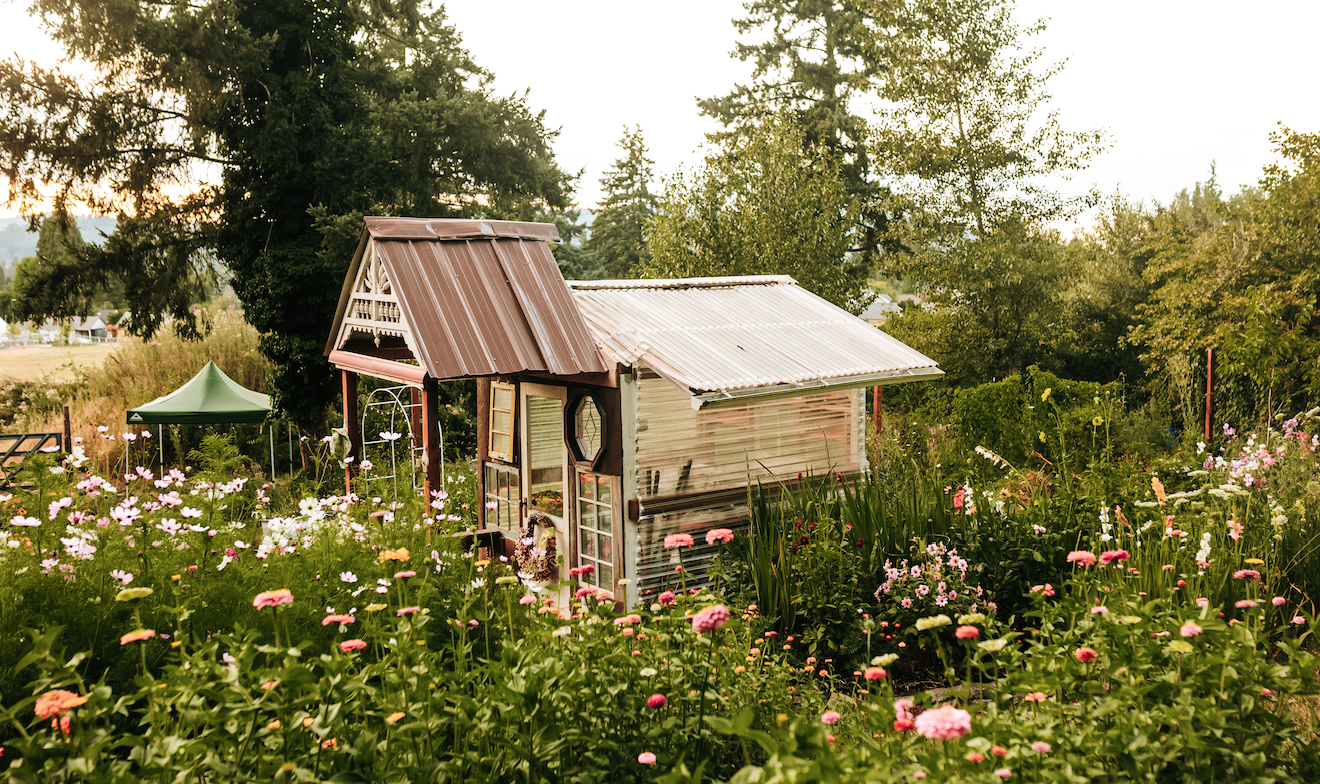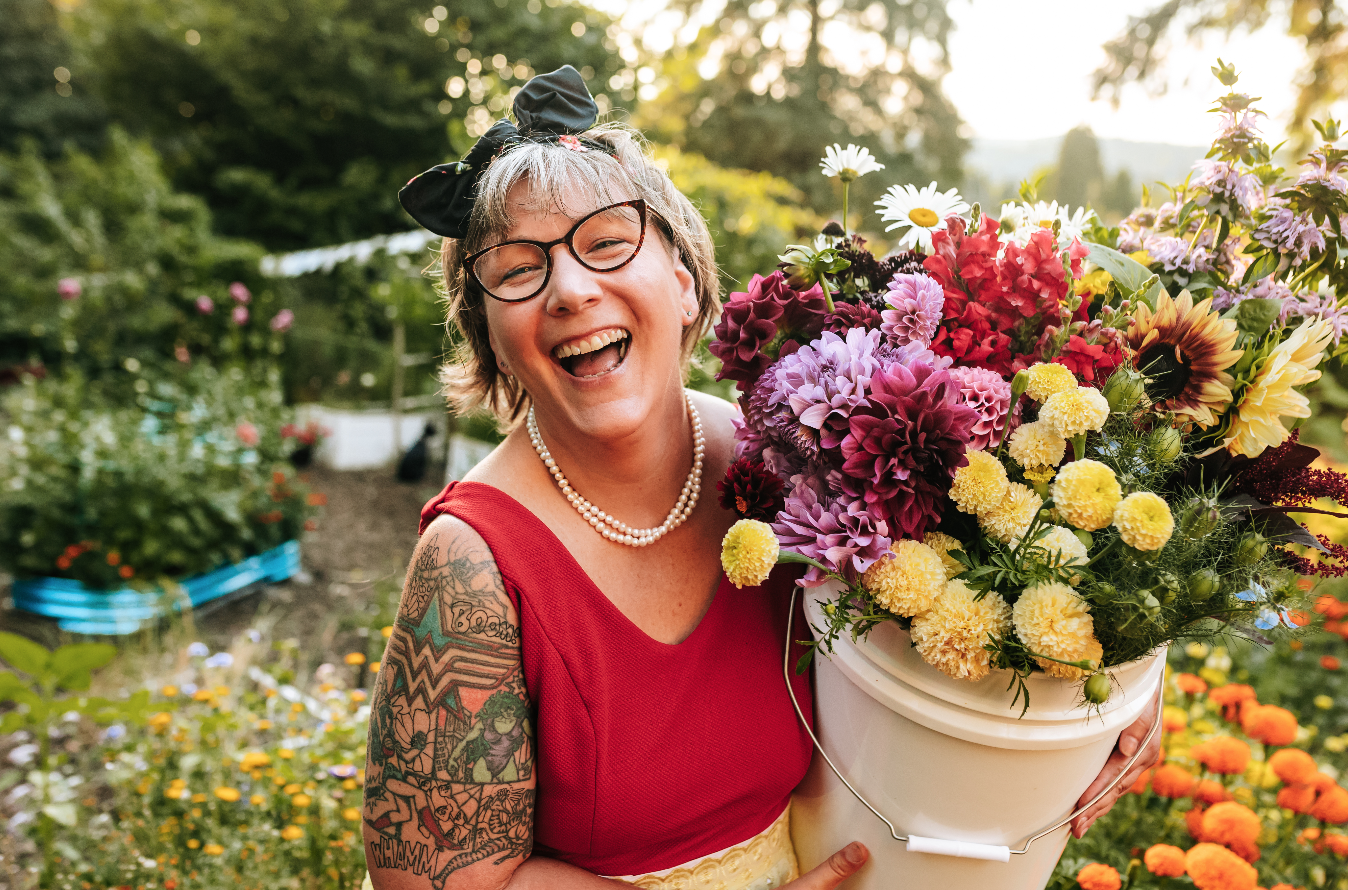The rolling hills and fertile valleys of Oregon have long been a haven for sustainable agriculture. But in recent years, a new crop has begun to bloom across the state: locally grown flowers. Unlike their commercially produced counterparts, often flown in from distant countries and heavily sprayed with pesticides, these blooms boast a lower carbon footprint and a fresher, more vibrant presence.
Cindy Ingram, owner of Happy Hill Homestead in Cottage Grove, is a testament to this burgeoning trend. Pre-pandemic, Ingram was active locally as an events promoter, and she also owned Pacific Pubs Cycle. With her usual businesses on hold during the pandemic, Ingram, like many others, sought solace and purpose closer to home. “I had this new house with a half-acre on a challenging hillside,” she recalls. “So I started a farm.”
As Ingram re-evaluated her priorities and reconnected with nature, flower farming offered a unique opportunity to combine passion with environmental responsibility. For years now, there’s been an ongoing conversation about the benefits of eating local food for the consumer, the grower, and the community. Choosing local flowers has similar benefits.
“Flowers have a far greater carbon footprint than vegetables,” Ingram explains. A rose, for example, might be grown in South America then flown to the U.S. and shipped in a refrigerated truck across the country, generating significant emissions. Locally grown flowers, on the other hand, travel a fraction of that distance.
But the benefits extend beyond sustainability. By the time you get flowers from a commercial flower shop, they could have been picked days or even weeks ago. Since you can get your local flowers on the day they were picked, these blooms will likely last longer. Local farms often offer a wider variety of unique and seasonal flowers, unavailable through traditional mass-market channels. They also foster a deeper connection between the consumer and the product.
Another bonus of buying flowers from a local farmer is that you can request specific flowers or new varieties that you wouldn’t normally get from a commercial flower outlet. If you know that you want certain colors or varieties for an event you’re planning for the future, for instance, talk to a local flower farmer and ask if they can grow exactly what you want. Plus, Ingram says, the flowers just make her happy and she wants to share that joy.

“I love to hand somebody flowers and watch their face light up,” says Ingram. “Flowers make people happy.”
Her philosophy extends beyond simple bouquets. Ingram envisions her farm as a destination, a place for visitors to not only experience the joy of flowers firsthand but have other experiences as well. “The idea,” she explains, “is to encourage people to learn about local farms. It can be a fun, family-friendly activity that’s very much like other things we do in the Pacific Northwest, like going out for hikes to beautiful waterfalls and enjoying a beautiful place. With a visit to a flower farm, you’re getting outside and learning where your flowers come from.”
Ingram is motivated by the colors of her blooms. “I feel like I’m growing colors rather than growing flowers sometimes,” she says. “I love it.”

She loves the colors of her flowers so much that she translates them into abstract paintings that you can also buy from her flower farm. She grows a wide variety of pesticide- and herbicide-free annual and perennial flowers, herbs, and foliage such as dahlias, zinnias, cosmos, and sunflowers. Ingram sells on a wholesale basis, by the bucket. Part of the fun of getting a bucket is the surprise of what you find inside — but if you have a “vibe” or a style you’re going for, just ask and Ingram or any flower farmer you buy from should be able to help you out. In addition to the buckets, Ingram’s Happy Hill Homestead is open to the public for u-pick flowers, already-picked flowers, and art by her and others at her farmstand. “It will be a mini flower and art event each week with different artisans setting up booths to sell their work,” she says. “It’s a super special and unique way to spend your Sunday mornings in July and August.”
Next time you’re looking for flowers for an event, a gift, or just to beautify your countertop at home, see what’s out there from local growers. You’ll be supporting a local farmer, and getting a bounty of beautiful blooms at the same time.
Happy Hill Homestead
Find the flower farm entrance off Taylor Street, behind the softball field at the bottom of the property. The Google address leads to the top, not the entrance.
U-pick Sundays, 10am-2pm, July and August only
thehappyhillhomestead.com


